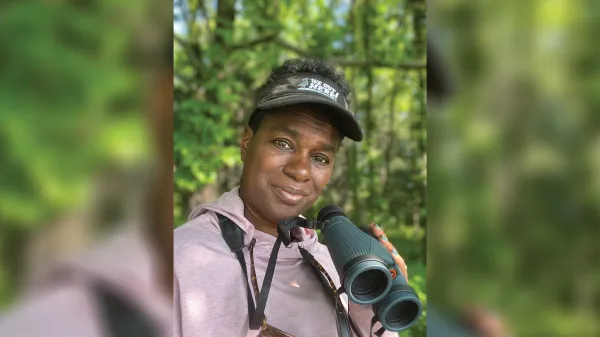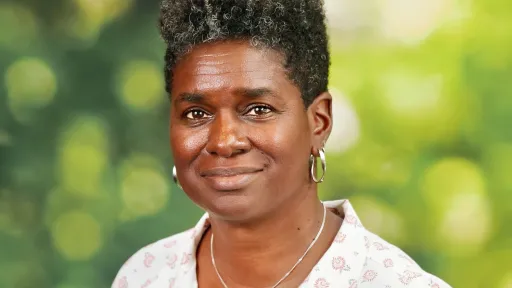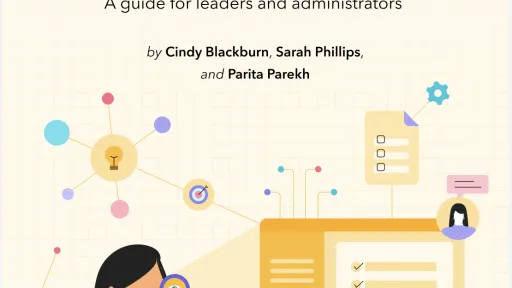From Spanish and Latino studies grad to teacher and now director of academic technology, Erika Eason has emerged as a dynamic leader in her various roles over the years at Maret School in Washington, D.C. Access Points caught up with Eason to discuss her interesting journey, how she’s made her mark at the school, the importance of DEI in ed tech, and more.
Access Points: Please give readers a little bit about your career journey. How did you end up in ed tech at Maret School?
Eason: I studied Spanish and Latino studies at Cornell because that’s what I was passionate about. I had no plans at that time of being an educator; in fact, I often proclaimed when I was in college that I would never be a teacher.
I was ready for a break from school after I graduated from Cornell (University), so for a year, I remained in Ithaca (New York) and worked two jobs: one at a campus library and the other as a restaurant hostess/cashier.
After that, I completed a year of national service with the AmeriCorps National Civilian Community Corps (NCCC) during which I was based on the East Coast and completed various service projects with my team.
When my term of service with NCCC ended, I was low on funds, so I moved back home to Baltimore to live with my parents. After a few months at home, I had an opportunity to interview for a Spanish teaching job at Roland Park Country School (RPCS), an independent school that was the sister school of the one I had graduated from (Bryn Mawr School).
Even though I’d never taught a day in my life and I was doubtful they’d hire me, I interviewed anyway, figuring, “What the heck!” Lo and behold, they did hire me as a long-term substitute Upper School Spanish teacher. I started in November of 1997. Fast-forward 27 years, and I’m still in education.
The way that I ended up in the technology side was, after 14 years of teaching Spanish (10 at RPCS, four at Maret), I wasn’t sure if I wanted to continue doing so. I quite enjoyed teaching middle schoolers, but I was not feeling challenged by the level of Spanish I taught, and I was also really drained.
So, when I informed my school that I wasn’t certain if I would be returning, they let me know there was a new position that had been created for an instructional technologist. I had substantial experience teaching with technology from my time at RPCS, which had a 1-to-1 laptop program. This new position seemed like it might be a good opportunity for me to move into a different field while staying in education. I interviewed, got the job, and I’ve been on the ed tech side of the school since 2011.
AP: What about Maret has kept you there for so long?
Eason: I believe I am an educator at my core, yet I am always surprised by how long I've been in education! What has kept me at Maret, specifically? Besides the fact that I have wonderful, smart colleagues, I think the fact that I haven’t been doing the same job for all 17 years is a major component in what has kept me there.
[About five years after I became instructional technologist], our director of technology left. Then, I had an opportunity to become the director of academic technology, which was another new position at the school.
A few years later, I was starting to evaluate if I wanted to continue in this job when the [COVID-19] pandemic hit. The experience of dealing with that allowed me to draw more deeply on the skills I’d been acquiring both on the job and through my master’s program. It allowed me to engage in my work in a different and more impactful way. I’m fortunate that I’ve had opportunities at Maret to change things up and develop new areas of professional interest.
AP: How would you define your style of leadership? How are you leading ed tech transformation at Maret School?
Eason: My style of leadership is more facilitative than directive and reflects how I see my role more as serving as a bridge to the solution — and not always as the solution itself. Yes, I am knowledgeable about integrating tech into the classroom, but so are other people at my school. My colleagues have deep experience, skills, and talent, and I love having opportunities to spotlight them and also promote peer-to-peer learning. For example, there are nonconference-style tech workshops that I organize each year for all Maret faculty. For this, I ask the faculty to submit tech topics they’d like to learn more about, and I recruit colleagues who are willing to host sessions on those topics. Then, people go to whichever sessions they’d like, and we all spend a couple of hours learning from each other. In this and other events I’ve coordinated, I’ve found it most effective to ask people what they want to learn or get support with, and then I endeavor to make that happen for them.
AP: Why do you think it’s important to continue fostering DEI initiatives at independent schools?
Eason: Being a Black American woman in the tech space has been an interesting experience. I think the image many have of a “typical” tech worker is that of a cisgendered, able-bodied, straight, white man. For a long time, many tech creations were built with the interests of that population in mind. Even though now there are growing numbers of people of color, women, and women of color in the technology landscape, we’re still in the minority.
Technology is this space that could help provide access to everyone — I was reminded of this when I read the interview Access Points did with Robert Drake [Access Points, Leader Profile, Spring 2024], director of technology who is also Deaf (I also remember meeting him at an ATLIS conference).
There are so many ways that technology is (and rightfully gets) demonized — not the technology itself, but how we humans leverage it. We sometimes use a great tool for its worst purposes.
But then I think about the access and ability technology provides for people who feel disenfranchised to amplify their voices. That potential of tech is another reason ATLIS should maintain a focus on DEI in 2024.
That focus includes examining issues of accessibility. In my experience, there has not been as much awareness around the wide range of accessibility needs a school community might have, and we need to make sure we have a better understanding of the needs of our populations and our families. This involves looking at accessibility through more than a disability lens.
For example, if we have folks for whom English is their second or fourth language or have families who aren’t necessarily as conversant in English, how are we making sure that the materials we produce are accessible to everyone in our community? Technology can be a tool to help do that, it’s appropriate for schools and for ATLIS to maintain that focus. The lack of diversity in tech that I mentioned earlier means that the people who are developing all of these technology tools don’t represent everyone, and they may not care whether their creation works for everyone. We need to be able to examine these creations critically and ask, “Who is this for? Who made this?”
Thinking about the question of fostering DEI and accessibility, I feel like many independent schools have somewhere in their mission or philosophy that they are “warm, welcoming, joyous,” or similar positive, affirmational words. But how can a school be that place if it also pretends that members of its community don’t have certain needs or if it doesn’t try to meet those needs? I don’t think most institutions are willfully and intentionally disregarding people. I know that unlike public schools, independent schools are not required to enroll every student who’s in our area, so maybe we don’t have to make sure our materials are in multiple languages, we don’t have to make sure that our content is accessible by a screen reader. But we should.
At Maret, we’ve been having conversations around AI, and many of our world language teachers are native speakers of the language they’re teaching. When it was time to write our narrative reports, I saw this really interesting disconnect in our faculty.
During that time, I heard some of the native English speakers express concerns that using AI to write comments might be considered “cheating.” However, when I listened to some teachers who were not native English speakers talk about their experiences of writing reports while having access to AI-powered writing tools like Grammarly, their descriptions of having access to those tools often involved sighs of relief.
That’s one example to illustrate the need to have conversations about why we shouldn’t automatically deride the use of these tools: consider that maybe you’re not the person for whom it’s really useful. If someone can use an AI-powered tool to help them do their job better, then we need to think twice about how we are possibly denigrating that use.
AP: How has your involvement with ATLIS helped you grow?
Eason: ATLIS has been a useful network for meeting other independent school educators. I've enjoyed the ATLIS conferences and found them helpful. I’ve seen how the organization has grown over time and provided more and more resources. For example, when gen-AI exploded on the scene, ATLIS offered the AI Symposium — twice!
ATLIS provides spaces and resources, both synchronous and asynchronous, for us to come together. It promotes the idea that the folks in the technology departments at our schools need to have seats at the table; we need to be able to articulate and communicate what value we bring to our schools. The support and resources ATLIS provides have helped me grow professionally. I appreciate the salary report they produce. Tech is so interesting because a lot of the folks who end up in this field didn’t initially train for it. We have completely different backgrounds, and you end up with this interesting mix of people bringing a wide range of skills and experiences to their work. Having an organization that helps corral us all together so we are able to learn from each other is one of the things that’s cool about both the tech and ed tech sides of things and ATLIS as an organization.
AP: What gets you out of bed in the morning?
Eason: I spent my junior year of college abroad in Seville, Spain, which was one of the most transformative years of my life. One of the big lessons that I learned from the culture in southern Spain is trabajar para vivir, no vivir para trabajar; that is, “You work to live, you don’t live to work.” I’m proud of my work, and I am glad that I’m good at my job; I try to bring high levels of performance to what I do, which does provide me some satisfaction. But it is not my identity. I'll always see myself as an educator, but my job as a director of academic technology is not core to who I am. I do what I need to do in order to be able to do the things that I love to do. Like being in and observing nature. Like dancing, traveling, bird-watching, reading, listening to music. Like spending cherished time with family and friends. My job allows me to do all of those things.
Get to Know Erika Eason

HOMETOWN: Baltimore, Maryland
EDUCATION: B.A. in Spanish, concentration in Latino studies, Cornell University; M.Ed. in instructional technology, University of Maryland Global Campus
HOBBIES: Dance, bird-watching, hiking, reading, trivia, and watching TV and movies
FAVORITE AUTHORS: Octavia Butler and N.K. Jemisin
FUN FACT (SOMETHING THAT MAY SURPRISE YOUR PEERS): “I was a semifinalist in the Jeopardy! 2018 Teachers Tournament. I did not win, but I had a really great time.”




